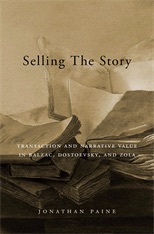
Jonathan Paine, Selling the Story. Transaction and Narrative Value in Balzac, Dostoevsky, and Zola
A literary scholar and investment banker applies economic criticism to canonical novels, dramatically changing the way we read these classics and proposing a new model for how economics can inform literary analysis.
Every writer is a player in the marketplace for literature. Jonathan Paine locates the economics ingrained within the stories themselves, revealing how a text provides a record of its author’s attempt to sell the story to his or her readers.
An unusual literary scholar with a background in finance, Paine mines stories for evidence of the conditions of their production. Through his wholly original reading, Balzac’s The Splendors and Miseries of Courtesans becomes a secret diary of its author’s struggles to cope with the commercializing influence of serial publication in newspapers. The Brothers Karamazov transforms into a story of Dostoevsky’s sequential bets with his readers, present and future, about how to write a novel. Zola’s Moneydocuments the rise of big business and is itself a product of Zola’s own big business, his factory of novels.
Combining close readings with detailed analyses of the nineteenth-century publishing contexts in which prose fiction first became a product, Selling the Story shows how the business of literature affects even literary devices such as genre, plot, and repetition. Paine argues that no book can be properly understood without reference to its point of sale: the author’s knowledge of the market, of reader expectations, and of his or her own efforts to define and achieve literary value.
Table of Contents
Notes on Citation
Introduction: The Economics of Narrative
The Role of Economic Criticism
The Importance of the Publishing Context
Literature as Transaction
The Notion of Literary Value
Balzac, Dostoevsky, and Zola
1. Balzac: Narrative as Business
“Phrase-Mongers” (Marchands de phrases)
La Torpille: Experiments in Narrative Value
Esther: The Prospectus, Production Model
Lucien: Deconstructing the Prospectus
Vautrin: Vautrin or Vaut rien—Who Decides?
2. Dostoevsky: Who Buys the Story?
Reform, Experiment, and the Novel
How to Write a Novel?
The Novel as Prospectus
The Rejection of Prospectus
Auction: The Return of Commercial Value
Speculation
3. Zola: The Business of Narrative
The Commercialisation of the Book
The New Economics of Fiction
Zola as Promoter of Story and Book
From Promoter to Managing Director
La Curée: The Narrative of Business
L’Argent: The Business of Narrative
Conclusion: Accounts
Appendix A: Serialisation of The Brothers Karamazov
Appendix B: The Thirty-Eight Retellings of the Murder of Fedor Karamazov
Notes
Acknowledgements
Index